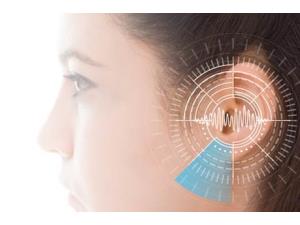



Date:07/05/19
 Personal gadgets known as "hearables," which communicate with the neural signals passing through our ears in order to monitor and interact with our brains, are on their way.
Personal gadgets known as "hearables," which communicate with the neural signals passing through our ears in order to monitor and interact with our brains, are on their way.
Hearables could help us focus on specific conversations, like smart hearing aids, or monitor our brain activity to treat tinnitus. That's according to Poppy Crum, the Stanford University neuroscientist and chief scientist at Dolby Laboratories who coined the term, who recently wrote about the concept in IEEE Spectrum.
The emerging tech stands to blur the lines between artificial and biological intelligence, Crum argues — augmenting our thought processes and collaborating with our brains.
Plug And Play
Other wearables, like Google Glass, were ridiculed for being dorky and potentially creepy. But a hearable could help people isolate specific conversations or monitor neural health without constantly being the topic of conversation by curious passers-by.
And the ear is the logical choice for such a connection to the brain, argues Crum.
"The ear is like a biological equivalent of a USB port," writes Crum. "It is unparalleled not only as a point for 'writing' to the brain, as happens when our earbuds transmit the sounds of our favorite music, but also for 'reading' from the brain."
Surround Sound
Based on the progress of various teams around the world, Crum argues that the technology for these wearable brain-computer interfaces could be developed within five years.
"When we do, hearables will constantly and silently assess and anticipate our needs and state of mind while helping us cope with the world around us," Crum writes. "They will be our true life partners."
Stanford Scientist Says in-Ear Gadgets Will Be Able to Monitor Our Brains
 Personal gadgets known as "hearables," which communicate with the neural signals passing through our ears in order to monitor and interact with our brains, are on their way.
Personal gadgets known as "hearables," which communicate with the neural signals passing through our ears in order to monitor and interact with our brains, are on their way.Hearables could help us focus on specific conversations, like smart hearing aids, or monitor our brain activity to treat tinnitus. That's according to Poppy Crum, the Stanford University neuroscientist and chief scientist at Dolby Laboratories who coined the term, who recently wrote about the concept in IEEE Spectrum.
The emerging tech stands to blur the lines between artificial and biological intelligence, Crum argues — augmenting our thought processes and collaborating with our brains.
Plug And Play
Other wearables, like Google Glass, were ridiculed for being dorky and potentially creepy. But a hearable could help people isolate specific conversations or monitor neural health without constantly being the topic of conversation by curious passers-by.
And the ear is the logical choice for such a connection to the brain, argues Crum.
"The ear is like a biological equivalent of a USB port," writes Crum. "It is unparalleled not only as a point for 'writing' to the brain, as happens when our earbuds transmit the sounds of our favorite music, but also for 'reading' from the brain."
Surround Sound
Based on the progress of various teams around the world, Crum argues that the technology for these wearable brain-computer interfaces could be developed within five years.
"When we do, hearables will constantly and silently assess and anticipate our needs and state of mind while helping us cope with the world around us," Crum writes. "They will be our true life partners."
Views: 396
©ictnews.az. All rights reserved.Similar news
- Azerbaijani project to monitor disease via mobile phones
- Innovative educational system to be improved under presidential decree
- NTRC prolongs license of two TV and radio organizations for 6 years
- Azerbaijan establishes e-registry for medicines
- Azerbaijani museum introduces e-guide
- Nar Mobile opens “Nar Dunyasi” sales and service center in Siyazan city
- International conference on custom electronic services held in Baku
- OIC secretary general to attend COMSTECH meeting in Baku
- Azerbaijan develops earthquake warning system
- New law to regulate transition to digital broadcasting in Azerbaijan
- Azerbaijani State Social Protection Fund introduces electronic digital signature
- Intellectual traffic management system in Baku to be commissioned in December
- Tax Ministry of Azerbaijan started receiving video-addresses
- World Bank recommends Azerbaijan to speed up e-service introduction in real estate
- Azerbaijan to shift to electronic registration of real estate





















